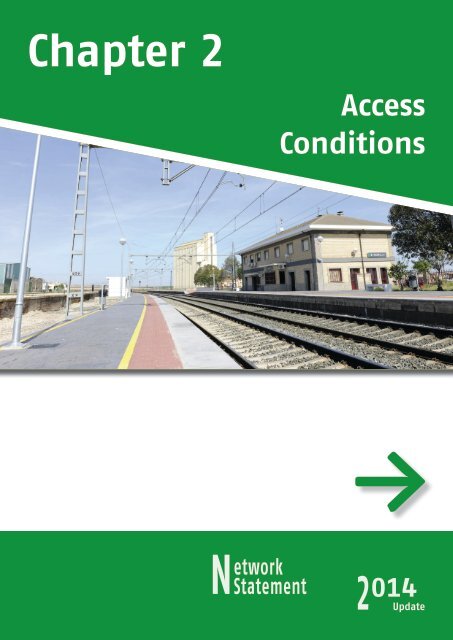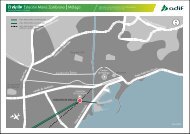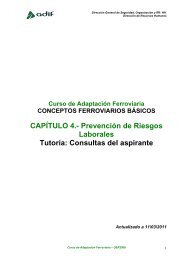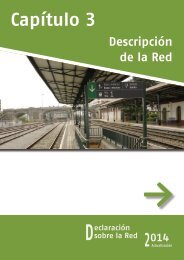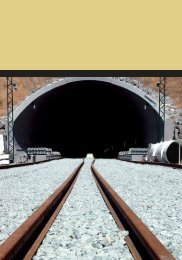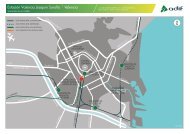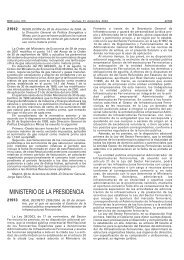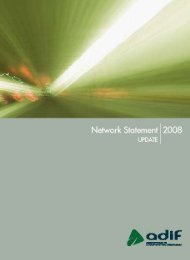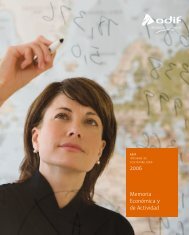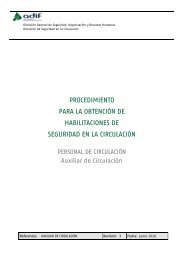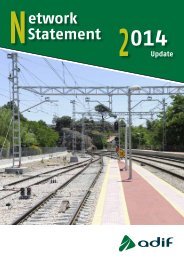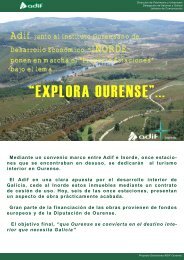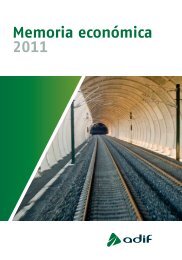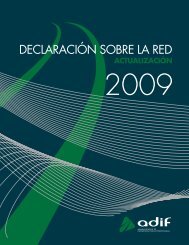Chapter 2: Access Conditions V.0 - Adif
Chapter 2: Access Conditions V.0 - Adif
Chapter 2: Access Conditions V.0 - Adif
Create successful ePaper yourself
Turn your PDF publications into a flip-book with our unique Google optimized e-Paper software.
<strong>Chapter</strong> 2<br />
<strong>Access</strong><br />
<strong>Conditions</strong><br />
Network<br />
Statement<br />
2 014<br />
Update
<strong>Chapter</strong> 2<br />
<strong>Access</strong><br />
<strong>Conditions</strong><br />
Network<br />
Statement<br />
2 014<br />
Update
2<br />
2.1<br />
Introduction<br />
According to Rail Sector Act LSF, RFIG (rail system) managed<br />
by <strong>Adif</strong> is accessible – under the terms established therein<br />
- for RUs holding a License and Safety Certificate in force<br />
issued by the Ministry of Public Works or relevant body<br />
in another European Union Member State, for freight rail<br />
transport services, international passengers, or national<br />
passenger rail transport for primarily touristic purposes.<br />
RUs are entities holding a Railway Undertaking license, the<br />
principal business of which is to provide services for the<br />
transport of goods and/or passengers by rail, under LSF<br />
terms. There is a requirement for undertakings to ensure<br />
traction, and this also includes undertakings that provide<br />
traction only (Article 43 in LSF and Article 58, 1 st and 2 nd in<br />
RSF).<br />
RUs and Applicants that wish to operate on <strong>Adif</strong> Managed<br />
Network must be registered in the Special Railway Register<br />
(Article 55 of Spanish Rail Sector Act and Article 129 of the<br />
Rail Sector Regulation), reporting to the Ministry of Public<br />
Works.<br />
2.2<br />
gENERAL ACCESs<br />
Requirements<br />
<strong>Access</strong> by RUs to <strong>Adif</strong> Managed Network shall comply with the provisions of Rail Sector Act and its implementing regulations<br />
(Art. 58 to Art.97 of RSF).<br />
A relevant requirement for these is to hold the following:<br />
♦♦<br />
♦♦<br />
♦♦<br />
RU License.<br />
Safety Certificate.<br />
Allocation of the necessary infrastructure capacity.<br />
2.2.1. Requirements to Request Infrastructure Capacity<br />
Allocation<br />
Entitled to submit applications for infrastructure capacity in<br />
accordance with Law and Rail Sector Act are the following:<br />
a) Railway Undertakings that previously have been<br />
RU licensed holding a relevant Safety Certificate<br />
and international business groups setting up said<br />
companies. All duly registered in the Special Railway<br />
Register.<br />
b) Transport actors, carriers, and combined transport<br />
operators that are interested in operating rail services<br />
and that hold the corresponding authorization, in<br />
accordance with Article 80 in Rail Sector Regulation.<br />
c) Public Administrations with powers to operate<br />
transport services and that are interested in<br />
presenting certain rail transport services.<br />
The right to use infrastructure capacity shall be assigned<br />
by the Rail Infrastructure Manager and, once assigned to<br />
an applicant, it may not be further assigned to another<br />
company. The use of capacity by a railway undertaking<br />
operating on behalf of a capacity grantee other than a RU<br />
shall not be considered to be an award. In any case, any legal<br />
business with allocated infrastructure capacity is forbidden<br />
(Article 35 of Rail Sector Act and Article 47 of Rail Sector<br />
Regulation).<br />
The request form for National Capacity is available in<br />
electronic form on NS link published on <strong>Adif</strong> Website www.<br />
adif.es, see Annex C. The request form for International<br />
Capacity is available in electronic form on htpp.//www.rne.<br />
eu. For the request and allocation process for international<br />
capacity corresponding to 2014-2015 timetabling the use of<br />
Path Coordination System (PCS) software tool is provided by<br />
RNE.<br />
However, RUs are also required to submit a certified copy<br />
of the corresponding Certificate of Safety that they hold,<br />
proving to know and meet Traffic Safety standards, i.e <strong>Adif</strong><br />
General Traffic Regulation (RGC) and other valid regulations<br />
affecting these, see Annex F, and be up to date with<br />
payments arising out of financial obligations owed to <strong>Adif</strong><br />
and <strong>Adif</strong> -Alta Velocidad.<br />
<strong>Access</strong> <strong>Conditions</strong><br />
33
2.2.2. Who may access <strong>Adif</strong> Managed Network<br />
National and International Freight<br />
Traffic<br />
According to the provisions of EU and Spanish law, freight<br />
transport is liberalized. Consequently, any Applicant based<br />
in Spain or another EU Member State may request <strong>Adif</strong> for<br />
Infrastructure Capacity Allocation in order to provide these<br />
transport services, following the established procedure.<br />
Upon capacity assignment, RUs performing the transport<br />
shall also hold a Safety Certificate required in order to move<br />
their rolling stock and driving personnel (who will be duly<br />
authorized therefore) on the route requested.<br />
International Passenger Traffic<br />
RUs have free access to Rail Network of General Interest<br />
(RFIG) managed by <strong>Adif</strong> for the purpose of operating<br />
international passenger services from 1 January 2010, as<br />
set out in Additional Provision Ten of Law 39/2003 of 17<br />
November, of the Rail Sector “International rail transport<br />
services for passengers. Framework agreements“, as<br />
amended by final provision one, section 2 of Law 15/2009,<br />
of 11 November in the Freight Land Transport Contract.<br />
It’s necessary to perform such transport services to hold<br />
the corresponding RU license granted by the relevant<br />
body in a EU Member State. For this purpose, International<br />
Passenger Transport Service means passenger transport<br />
service of trains that pass at least once through the border<br />
of Spain and with the main purpose of carrying passengers<br />
between stations in different Member States, the train may<br />
be set and/or split, and the different parts setting it may<br />
have different origins and destinations, provided that all<br />
carriages cross at least one border. Transit is understood as<br />
the passage through the Spanish territory without taking<br />
up or setting down passengers, and/or without loading or<br />
unloading freight in it.<br />
RUs wishing to perform international passenger rail<br />
transport may apply to the Ministry of Public Works for<br />
a railway License, or if applicable, amendments thereto,<br />
together with the relevant supporting documentation for<br />
this purpose.<br />
National Passenger Traffic<br />
Royal Decree Law 4/2013, of 22 February and Law 11/2013<br />
of 26 July on measures to support entrepreneurs and to<br />
stimulate growth and job creation, in their <strong>Chapter</strong> IV<br />
“measures in rail sector,” provide a basis for the liberalization<br />
of passenger transport by rail and ensures that this - as<br />
provided in Royal Decree Law 22/2012 - is produced in an<br />
orderly and progressive way, adding sections 2, 3, 4 and 5<br />
to transitional provision three of Rail Sector Act. According<br />
to the wording of said transitional provision three in Royal<br />
Decree Laws 22/20102 and 4/2013, and Law 11/2013:<br />
As of 31 July 2013 rail passenger transport for tourism<br />
purposes primarily shall be provided in a regime of free<br />
competition as set forth in Article 42.2 of Rail Sector Act<br />
and Order FOM/1403/2013 of 19 July. Therefore shall be<br />
considered passenger rail transport services for tourism<br />
purposes primarily - whether provided on a periodic basis<br />
or not - if all seats in the train are offered under a previous<br />
combination of sale or offer to sale with a fix global price<br />
which apart from rail transport services, includes major<br />
services to generally meet passenger demands performing<br />
journeys linked to recreational, cultural or leisure activities,<br />
providing rail transport services as a supplement. Under<br />
no circumstance shall be considered to be similar to this,<br />
activities with the main purpose of carrying passengers by<br />
rail.<br />
For rail transport services referred to in Article 53 in Rail<br />
Sector Act, the Council of Ministers shall establish the<br />
terms for public tenders under Art. 53.2 without prejudice<br />
to Article 5.6 of Regulation (EC) Nr. 1370/2007 of European<br />
Parliament and of Council of 23 October 2007. Until the<br />
service starts by a new operator –given the case- Renfe-<br />
Operadora shall continue to provide these services, fixing<br />
applicable compensations under the relevant contract.<br />
Without prejudice to the provisions of Article 42.2 in Rail<br />
Sector Act, temporarily, access for new operators to services<br />
that are not included afore shall be given if these hold<br />
respective certificates of approval.<br />
The Council of Ministers shall determine the amount of<br />
licenses to be granted for each line or group of lines where<br />
services shall be provided according to competition, as well<br />
as the period of validity for such approval certificates. The<br />
Ministry of Public Works shall grant operating licenses<br />
through the relevant tender procedure. This procedure<br />
shall be public and ensure effective competition among all<br />
competing operators.<br />
An Order of the Ministry of Public Works shall determine<br />
the terms to meet in order to be part in tender procedures<br />
as outlined in afore paragraph, as well as applicable granting<br />
different phases of the procedure. Anyhow to public<br />
passenger transport services by rail and road shall apply<br />
the provisions of Regulation (EC) 1370/2007, of European<br />
Parliament and Council of 23 October 2007 and - provided<br />
no further Order by the Ministry of Public Works on tenders<br />
- public sector contract law and developing rules.<br />
34<br />
Network Statement Update 2014 <strong>V.0</strong>
2<br />
2.2.3. Licenses and Approvals<br />
The body proceeding RU licenses and approvals for<br />
Applicants other than RUs is the Government Rail Safety<br />
Agency, in accordance with the new Transitional Provision<br />
Eight in Law 39/2003 of 17 November of the Rail Sector,<br />
implemented by Royal Decree Law 1/2014 of 24 January:<br />
“As long as the Government Rail Safety Agency - under 5th<br />
paragraph in section 1 of Additional Provision three in Law<br />
28/2006, of 18 July, on government agencies to improve<br />
public services - is not created, the duties of the authority<br />
responsible for rail safety shall be performed by the relevant<br />
governing bodies of the Ministry of Public Works.”<br />
Terms for granting these are in Section 4, <strong>Chapter</strong> 2 in Rail<br />
Sector Act and Section 3, <strong>Chapter</strong>s 2 and 3 in Rail Sector<br />
Regulation (RD 2387/2004, of 30 December).<br />
For more information please contact:<br />
General Department of Land Transport<br />
Paseo de la Castellana, 67- 28071 Madrid<br />
2.2.4. Safety Certificate<br />
The body granting the Safety Certificate is the Government<br />
Rail Safety Agency, in accordance with the new Transitional<br />
Provision Eight in Law 39/2003 of 17 November of the Rail<br />
Sector, implemented by Royal Decree Law 1/2014 of 24<br />
January: “As long as the Government Rail Safety Agency -<br />
under 5th paragraph in section 1 of Additional Provision<br />
three in Law 28/2006, of 18 July, on government agencies<br />
to improve public services - is not created, the duties of<br />
the authority responsible for rail safety shall be performed<br />
by the relevant governing bodies of the Ministry of Public<br />
Works.”<br />
Granting terms are in Royal Decree 810/2007, of 22 June<br />
amended by Royal Decree 641/2011, of 9 May.<br />
For more information please contact:<br />
Rail General Department<br />
Plaza de los Sagrados Corazones, 7- 28071 Madrid<br />
2.2.5. Civil Responsibility and Insurance<br />
The entity applying for a license shall have sufficient<br />
insurance - during the term – for Civil Liability imposed, i.e.<br />
for any damages caused to passengers, goods, baggage, mail<br />
or third parties. Likewise, this guarantee shall cover liability<br />
for damage to railway infrastructure, trains or third parties,<br />
persons or goods, requiring, given the case, a compulsory<br />
passenger insurance. All in accordance with Article 48 in<br />
Rail Sector Act, Article 63 in Rail Sector Regulation, amended<br />
by additional provision seven of Royal Decree 810/2007, of<br />
22 June. Specifically, Rail Sector Regulation lays down the<br />
amount and terms of liability coverage depending on the<br />
nature of the services to be provided.<br />
Similarly, Article 91 in Railway Sector Regulation specifies<br />
that carriers and consignees of freight delivering or<br />
accepting it at rail logistics facility must be authorized to<br />
enter into such a facility with suitable vehicles, provided<br />
that the corresponding insurance covers the civil liability<br />
that may arise for damages that could cause.<br />
Furthermore, owners of freight wagons or passenger<br />
coaches who deliver these to railway undertakings for<br />
carriage, must have a liability insurance covering damage<br />
to people, rail infrastructure or others caused if they are<br />
involved in a train accident occurred for reasons attributable<br />
to them for their failure to comply with applicable regulation.<br />
<strong>Access</strong> <strong>Conditions</strong><br />
35
2.3.1. Framework Agreements<br />
2.3<br />
General Terms<br />
and <strong>Conditions</strong><br />
Rail Infrastructure Manager may conclude framework<br />
agreements with applicants to use rail infrastructure<br />
capacity longer than the working timetable.<br />
Framework agreements shall not specify paths, but shall<br />
establish the characteristics of the infrastructure capacity<br />
requested and offered to applicants and procedures to<br />
completely satisfy the rights of other applicants and<br />
their legitimate business needs. They may also establish<br />
guidelines for cooperation between the Rail Infrastructure<br />
Manager and applicants to improve the quality of services<br />
offered.<br />
2.3.2. Agreements to Provide Services<br />
<strong>Adif</strong> may conclude agreements with Railway Companies or<br />
any public or private entity, which may be on the use regime<br />
of facilities or units of common interest and may perform<br />
supplementary business activities upon agreement or if<br />
required to be fulfilled.<br />
Contracts to provide services between RUs and <strong>Adif</strong><br />
may include service request procedures, acceptance of<br />
terms, service suspension or termination terms, as well as<br />
obligations and duties arisen or other necessary to properly<br />
provide these services.<br />
Signing said agreements cannot prevent <strong>Adif</strong> from providing<br />
services for others similar to hereunder, without prejudice<br />
to the agreed quality levels.<br />
<strong>Adif</strong> has a set of rules and regulations required for train<br />
traffic and shunting performed safely and efficiently.<br />
People participating in traffic are required to meet these, as<br />
applicable to their duties.<br />
The most important are:<br />
♦♦<br />
♦♦<br />
♦♦<br />
General Traffic Regulation (Reglamento General de<br />
Circulación RGC).<br />
Specific Operating Rules (NEC) applicable to the<br />
high-speed lines Madrid – Córdoba – Sevilla, La Sagra<br />
- Toledo and Córdoba - Málaga.<br />
Technical and Operating Requirements of Traffic and<br />
Safety (PTO) applicable to high-speed lines Madrid<br />
- Zaragoza - Barcelona - French Border, Madrid<br />
Puerta de Atocha - Valencia Joaquin Sorolla, Albacete<br />
Branching - Alacant Terminal, Madrid Chamartín -<br />
Valladolid Campo Grande, Coto da Torre Branching<br />
– Branching to Grandeira.<br />
Pending approval of a new General Traffic Regulation, Rail<br />
<strong>Adif</strong> along with RUs and other authorized Applicants may<br />
set up, where appropriate, Contracts to provide services<br />
describing the scope of contracted services (Additional,<br />
Supplementary and Ancillary upon request).<br />
Moreover, any Railway Undertaking, holding the respective<br />
License and Safety Certificate for any certain line, shall sign<br />
an agreement with <strong>Adif</strong> and <strong>Adif</strong> Alta Velocidad to obtain<br />
traction electric power supply and with <strong>Adif</strong> in order to<br />
obtain fuel supply.<br />
Price of charges for <strong>Adif</strong> services payable by RUs and other<br />
authorized Applicants, shall generally be determined as<br />
indicated in <strong>Chapter</strong> 6 of this NS. However, the Agreement<br />
may set any specific circumstances agreed upon with <strong>Adif</strong>,<br />
if applicable.<br />
Traffic<br />
Regulations<br />
2.4<br />
Sector Act shall apply for rail traffic safety and by virtue of<br />
transitional provision one of Rail Sector Regulation, afore<br />
provisions in this regard shall apply.<br />
By virtue of Additional Provision eighty nine in Law<br />
17/2012, of 27 December on General State Budget, provisions<br />
applicable to the Railway Network of General Interest<br />
regarding Traffic Safety shall apply to metric gauge lines<br />
State-owned. However, as long as new technical standards<br />
specific for metric gauge rail system are not implemented,<br />
the provisions currently valid for that rail system shall<br />
apply, i.e. Rail Traffic Regulation and Signaling Regulation.<br />
Rail Freight Corridors numbers 4 and 6, shall be governed by<br />
regulation on traffic flow on every network of the various<br />
infrastructure managers where trains run. Consequently,<br />
routes along <strong>Adif</strong> Managed Network shall be governed by<br />
national standards.<br />
The full texts of these standards are available in electronic<br />
format on the corresponding link to the NS as published on<br />
<strong>Adif</strong> website, www.adif.es.<br />
36<br />
Network Statement Update 2014 <strong>V.0</strong>
2<br />
2.5<br />
Exceptional<br />
Transports<br />
A transport is considered exceptional if it appears to be<br />
difficult to perform it due to size, weight and/or packaging,<br />
considering infrastructure or material to use that requires<br />
special technical or operating conditions for consignment on<br />
RFIG managed by <strong>Adif</strong> in fully safe conditions. The procedure<br />
of these consignments is regulated in General Instruction IG<br />
02 of 24 July 2009. (See Order FOM/233/2006 of 31 January,<br />
and section 4.7.1. and Annex F hereunder).<br />
For more information, please consult Traffic Safety<br />
Department (<strong>Adif</strong> Directory, section 1.8).<br />
The Commission of Consignment and Exceptional Transport<br />
prescriptions made up of different rail operators and<br />
<strong>Adif</strong>, hereinafter CPCTE, is responsible for managing and<br />
processing authorizations for exceptional transports.<br />
2.6<br />
TRANSPORT of<br />
Dangerous Goods<br />
Royal Decree 412/2001 defines dangerous goods as<br />
substances or objects of which the carriage is prohibited or<br />
authorized only under certain conditions established in the<br />
Regulations concerning International Carriage of Dangerous<br />
Goods by Rail (RID) and other specific legislation regulating<br />
such transport, as the IG 43. Please consult section 4.7.2 in this<br />
document and Annex F. This type of transport may only be<br />
performed by RUs holding a specific license for this purpose.<br />
For additional information, please consult Traffic Safety<br />
Department (<strong>Adif</strong> Directory section 1.8).<br />
2.7<br />
The criteria for approval and authorization of rolling stock as<br />
well as regarding maintenance of rolling stock, are described<br />
in Rail Sector Regulation, in Order FOM/233/2006 of 31<br />
January, which sets up the conditions for approval of railway<br />
rolling stock and maintenance centers, fixing certification<br />
price for such material, as well as Royal Decree 1434/2010,<br />
of 5 November on rail system interoperability on the General<br />
Interest Rail Network.<br />
Technical Specifications for Approval (ETH) of railway rolling<br />
stock are in force since February 2010, see Annex F.<br />
Railways General Department of the Ministry of Public Works<br />
issues the authorization to put into service the vehicle in<br />
question, prior report of the Certification Body. <strong>Adif</strong>, upon<br />
request from the vehicle manufacturer or its owner, issues<br />
through the Department of Traffic Safety, the Running<br />
Permit (See Order FOM/233/2006, Articles 12 and 13).<br />
Every vehicle, before commissioning or using it in the<br />
network shall have an entity in charge of its maintenance<br />
and registered in the corresponding section of the National<br />
Vehicle Register (Special Railway Register). In the particular<br />
rolling Stock Technical<br />
Requirements<br />
case of freight wagons, this entity shall be certified by the<br />
General Department of Railways, from 31 May 2012, by virtue<br />
of the criteria under “Committee Regulation UE/445/2011 of<br />
10 May, 2011 regarding a system of certification of entities<br />
dedicated to maintain freight wagons, which amends<br />
Regulation EC/653/2007”.<br />
In application of Additional Provision eighty nine in Law<br />
17/2012, of 27 December on General State Budget, metric<br />
gauge lines in State ownership shall be pursuant to provisions<br />
applicable on the General Interest Railway Network in<br />
terms of authorization and maintenance of rail rolling stock.<br />
However, as long as the new technical standards specific for<br />
metric gauge rail system are not implemented, the provisions<br />
currently valid for said rail system shall apply.<br />
<strong>Access</strong> <strong>Conditions</strong><br />
37
2.7.1. Inspection of Rolling Stock<br />
Any possible non-compliance detected will result in<br />
initiating disciplinary proceedings by virtue of Rail Sector<br />
Act. Furthermore, <strong>Adif</strong>, in view of a serious situation that<br />
potentially can jeopardize the safety of transport, may<br />
decide to suspend rail services or activities, pursuant<br />
to Article 86 of Rail Sector Act and Article 19 of Order<br />
FOM/233/2006.<br />
RU will be required to provide all support to the Inspection<br />
Services of the Ministry of Public Works and <strong>Adif</strong>, and RU<br />
shall neither be entitled to claim for economic damages from<br />
delays or disqualification of staff, equipment or systems,<br />
nor on a provisional basis. However, inspections shall cause<br />
the least possible disruptions to operations of RUs and other<br />
authorized Applicants.<br />
Rail Staff<br />
2.8 Requirements<br />
Rail Sector Act in its Article 60.1 provides that staff providing services in the rail sector shall have sufficient qualifications to<br />
provide rail services with due safety and efficiency guarantees.<br />
2.8.1. Certification and Training<br />
Rail staff shall comply with Order FOM/2872/2010 of 5<br />
November on the conditions to issue certificates that<br />
authorizes rail staff to perform certain duties regarding<br />
traffic safety; furthermore, aforementioned Order FOM<br />
determines the regime of approved medical and training<br />
centers for said staff. Circular Resolution 3/2010 of Rail<br />
Infrastructure Department, of 13 December 2010, governs<br />
the validity of medical fitness certificates issued by<br />
approved medical centers for railway staff, before and after<br />
9 November 2010.<br />
RUs must also prove that their staffs involved in train<br />
traffic process have appropriate training and the mandatory<br />
authorizations to perform their duties.<br />
In addition to holding updated Authorization Certificates,<br />
RU staff related to train traffic and shunting - as far as<br />
concerned - must know Traffic Safety Regulations and<br />
General Instructions, rail concepts and have basic technical<br />
and technological knowledge, have specific training on the<br />
line, train and control office, and must have knowledge of<br />
vehicles, regarding operation and infrastructure.<br />
In application of Additional Provision eighty-nine of Law<br />
17/2012, of 27 December on General State Budget, metric<br />
gauge lines in State ownership shall be pursuant to the<br />
provisions applicable to the General Interest Railway<br />
Network regarding railway staff, medical centers and<br />
railway staff training. However, insofar as new technical<br />
standards specific for metric gauge rail system are not<br />
implemented, standards currently valid for that rail system<br />
shall apply.<br />
2.8.2. Language<br />
All communications regarding Traffic Safety on <strong>Adif</strong><br />
Managed Network scope shall be in Spanish. In this<br />
regard, by virtue of European Union Directives and Traffic<br />
Regulation (General Traffic Regulation, RGC, Section 134),<br />
for communications relating to traffic safety, rail staff who<br />
relate to <strong>Adif</strong> must fully understand Spanish and use this<br />
language correctly to communicate.<br />
2.8.3. <strong>Adif</strong> Inspection of Staff<br />
Any possible infraction due to non-compliance with<br />
standards shall result in initiating relevant disciplinary<br />
proceedings pursuant toLSFRail Sector Act.<br />
RU will be required to provide all support to <strong>Adif</strong> in order<br />
to inspect staff, and RU shall not be entitled to claim<br />
for economic damages or delays for this reason, in case<br />
of disqualification of staff, even on a provisional basis.<br />
However, <strong>Adif</strong> shall ensure that inspections cause the<br />
least possible disruptions to operations of RUs and other<br />
authorized Applicants.<br />
38<br />
Network Statement Update 2014 <strong>V.0</strong>


